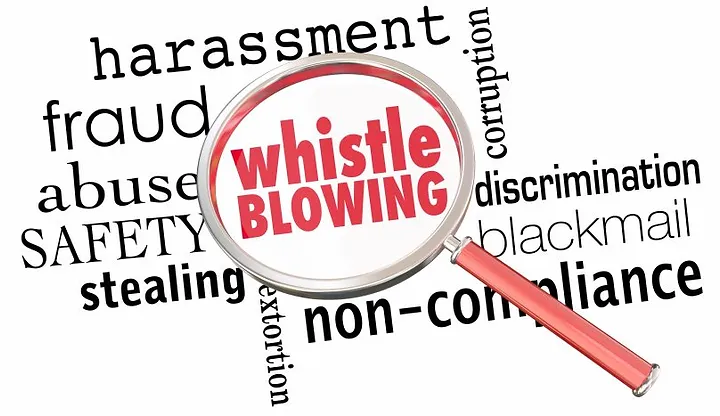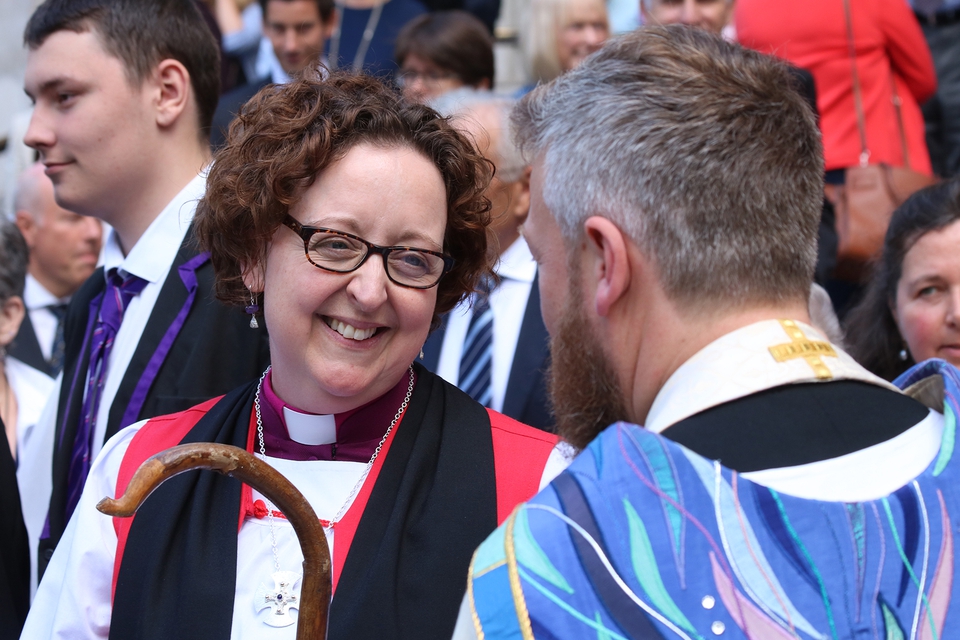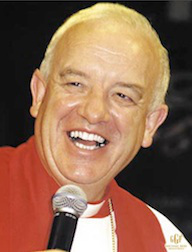
From time to time we hear about people working in various institutions, like the police or the Civil Service, who call out some murky or corrupt behaviour within their organisation. We call this action whistleblowing. It may be that someone brings to light financial irregularities or an intolerable level of oppressive hatred towards minorities. Such behaviour may involve misogyny or homophobia and this behaviour has become impossible for the bystander to tolerate. The whistle-blower is the one who speaks out. In most cases we hear about, we discover that the costs to the individual speaking out in this way have been considerable. Whether it is the blowback from colleagues, whose bad behaviour is exposed, or a heavy institutional response from the top of the organisation, the whistle-blower usually has to pay a heavy price and put up with the stress that comes as the result of his/her whistleblowing activity. In summary we would suggest that whistleblowing is a hazardous, even heroic, undertaking.
When we take a look at organisations in general, I think it would be true to state that whistleblowing is rare. The reasons for this are worth thinking about. It is far from clear that fear of persecution from colleagues is the main factor in repressing whistleblowing. A more straightforward explanation that inhibits the normal member of an institution ‘spilling the beans’, is simple loyalty to the group. This would be the normal dominating thought of most people in, say, a firm or factory. The rule of not ratting on your workmates or colleagues is normally going to create a far stronger inhibition than ideas of morality or a loyalty to a higher good.
The bonds that tie individuals to an organisation are, of course, not just considerations of simple loyalty to the group. We can imagine a variety of scenarios where circumstances or events create an unquestioned bond to a group which is hard to challenge. As an extreme example, we have all watched films where the gang leader ties the gang member into the group by forcing him or her to commit a crime. Once the new gang member has robbed a bank or shot someone, it is hard for them to have any way back from their new status as gang member. A blackmail situation has been activated. No one says it out loud, but the threat is always there. If we get arrested and go to prison, then so do you. It is hard to see any obvious way out of this conundrum.
From the extremes of a blackmail scenario in a criminal gang, one can imagine many other lesser ways that tie the individual to the group so that whistleblowing becomes unthinkable. The idea of loyalty sounds like an honourable value, but in many situations, it simply means that the individual has become acculturated to a particular way of doing things. We recognise that such group acculturation often does not have honourable outcomes. A group of men might bond together with a common interest in macho activity. This might include the domination of, or even cruelty, to the women in their lives. Other movements or groups may indulge in wild conspiracy theories or normalise phobic behaviour towards minorities. I find it hard to understand how groups of Christians can sometimes act with so much hatred towards those they do not like, such as gays or liberals, unless there are social benefits attaching them to this kind of group loyalty. Feeling good because your group hates the despised ‘other’ seems a remarkable inversion of Christian values. But it seems to exist in church settings just the same, seemingly impossible to challenge.
Before we return to a consideration of the whistleblowing phenomenon, it is important to linger for a moment on the account of group behaviour in a church context told by Yvonne and David Shemmings in their reflection on the child-abuse saga in the Diocese of Chichester. https://houseofsurvivors.org/shared-files/1186/?Shemmings_Report_ib4lHC8.pdf One suggestion that the Shemmings investigated was whether the abuse was organised. The evidence that was uncovered did not lead them to suggest a conspiracy of abuse. Rather they found such abuse was to some extent normalised in certain clergy networks so that offending clergy knew others who were, if not active abusers, able to look the other way if any evidence of such behaviour came their way. In this we are naming another group phenomenon which militates against whistleblowing, the almost sacred devotion to the preservation of secrets. Supressing information by insisting that others keep secrets is a very powerful dynamic within groups. Having a secret, knowing something that others do not know, allows an individual to feel endowed with a sense of power and privilege. One surmises that the popularity of Masonic groups is partly to do with the promise of secrets that will only be divulged to a privileged few. Cultic groups like Scientology also peddle in secrets about the origin of the universe. The power of Scientology has lessened considerably since much of this ‘secret’ hidden knowledge has been leaked out to all and sundry. More powerful than the meaning of masonic symbols and myths and theories about the beginning of the universe, are the human secrets that actually exist in groups like churches. Sometimes these secrets include hidden episodes of shame which relate to important leaders. Such leaders are controlled by the fact that, at any moment, documents or oral testimonies could be released which would destroy their reputation and authority. Where does real institutional power lie in such a complicated situation? The real power in the group probably belongs to the one who possesses the shameful secret, as long as no one has any past secret to reveal about them. Organisations which alternatively reveal and hide such secrets for political reasons are toxic environments to work in but they are found within the Church as in other organisations. One would prefer the attempt to blow fresh air into an institution through whistleblowing to the rancid air of power games and nervous stress that permeate so many organisations, including our own.
When we return to our consideration of whistleblowing, we might want to express our surprise that it ever happens. The whistle-blower has not only to face social ostracism and even violence from those guilty of bad behaviour. He/she has also to overcome the extensive social inhibitors that operate when we are part of any group. Nobody wants to ‘shop mates’. We have to conclude that,. when whistleblowing does happen, there need to be some highly principled and brave individuals at the heart of it. As a general rule we might want to suggest that such people are more likely to be worthy of our admiration than the opposite. Of course, there may be unworthy reasons for whistleblowing, but I also want to suggest that the person who breaks through all the social inhibitors to stand up and declare the truth is a brave unusual person.
In our survey of discussing why whistleblowing is a rare phenomenon in society and its organisations, we have noted that the reasons for this rarity have much to do with the nature of groups and organisations and the way they normalise and control our behaviour. Some of this institutional control is honourable but much is not. The dynamics of groups can make for a sense of stability but often that stability is very fragile because of the misdeeds and secrecy that can often be hidden within these groups. Currently the Church itself is going through a number of crises, as its ability to be open and honest with its members is being challenged. When an institution shows itself unable to be open and honest and selective over the information it shares, an atmosphere of mistrust is created. Those who challenge the narrative that the Church is ‘on a journey’ to deliver the highest standards of safeguarding to survivors, find that they, along with whistle-blowers everywhere, suffer the sanctions I have described. The Church has considerable institutional power to hit out at such critics which include those who are already victims of church-based trauma. The sight of a religious-based organisation playing dirty tricks, involving the heavy use of institutional and legal power, is not very edifying. As I have suggested before, the reverberations of these battles can never achieve what is desired, the protection of the power and assets of the organisation. What they do achieve is an atmosphere of unease, and a weakening of loyalty on the part of ordinary members towards the leadership.
The next meeting of General Synod is likely to show up the cracks that exist between the official narrative of unity and competence in the church and the real situation of muddle and intrigue that seems to exist at the centre. I have nothing useful to add to the gay marriage debate, but feel that an equal amount of time should been given to looking at the present state of safeguarding. There is, it can be confidently asserted, a great deal of unhappiness in the Church over safeguarding. The problems do not seem to relate to the training that is being widely shared across the Church but in the reluctance of the Church authorities to speak frankly of what has gone wrong in the past. Coverups, silence and persecution of whistle-blowers creates a toxic environment in which few can flourish or grow. Whistleblowing is a messy inefficient way of sharing truth, but it is an improvement on all the secrecy that seems to exist at the heart of our national Church. The hints that we are given suggest that maintaining the status-quo in the CofE safeguarding narrative is not only almost impossible for those in charge, but a cause of unbearable stress. Stress creates burn-out and we have seen a suggestion of this in the rapid turnover of those heading up the NST since its start in 2015. The forthcoming Synod safeguarding debate on February 9th will be instructive. Will the message be ‘business as usual’ or will there be a hint of changes, the kind that whistle-blowers seek to introduce to their organisations everywhere.




